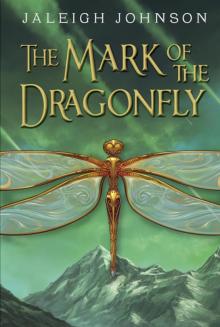- Home
- Jaleigh Johnson
The Secrets of Solace Page 2
The Secrets of Solace Read online
Page 2
So that was what it was. Lina’s heart sank. She knew a little bit about the lutea plant from her studies. It secreted a fine cloud of dust that acted as a paralytic on passing insects, which the plant then fed upon. In humans, the dust caused an allergic reaction when it came in contact with the skin.
But the lutea plant didn’t grow naturally inside old jewelry chests.
Anger flooded Lina. “You deliberately put the dust in there,” she accused.
“I don’t deny it,” Tolwin said, looking down at her hands and smiling. “I planted the dust to prove a point that you would all do well to remember,” he said, turning to face the class. “When you are examining an object that comes from another world, you must take nothing for granted. Even the most innocuous device may contain hidden dangers.”
Tolwin reached over and clasped Lina’s wrist in his hand. Before she could pull away, he lifted her arm so that the entire class could see the effects of the dust. Gasps and cries of “Eew, gross!” filled the room.
Blood pounded an unsteady rhythm in Lina’s ears as she tried to control her anger. Her fingers were now so swollen and red they looked like ugly little sausages. At least there was no pain, and so far, the sensation hadn’t spread past her hands, for which Lina was grateful. But she wouldn’t be able to pick anything up or even hold a pencil. No doubt that had been part of Tolwin’s intention. How long would her hands stay this way?
As if he sensed her worry, Tolwin released her wrist and returned to his podium. “Take your seat, Miss Winterbock,” he said, “and don’t look so glum. The effects of the dust are only temporary in humans. You should be able to use your hands again in a few hours. In the meantime, I hope you’ll contemplate this lesson and perhaps take a few notes on it—when you are able to, of course.” He smiled, and several of the students snickered.
Holding her head up, Lina walked back to her seat, but her face was almost as red from embarrassment and anger as her hands were from the dust. The bell that signaled the end of class began to toll just as she reached her desk. Bending over, Lina awkwardly slid her pile of books off her desk and into her arms. She tried to grab her pencil, but it skittered away from her numb fingers and fell to the floor. A group of girls giggled as they walked past her. Lina gritted her teeth and crouched down to try to pick up her pencil, but her hands were useless on the small object. Tears burned in her eyes, but Lina furiously blinked them away. She looked up to see if any of the apprentices had lingered in the classroom and might help her out, but everyone, even Simon and Tolwin, was gone.
At least they hadn’t stayed around to gloat. That was something. Lina abandoned her pencil and stood up, juggling her books into a manageable pile. She walked back down the stairs and left the classroom, already dreading the journey through the passages where the other students would see her swollen hands.
As if they needed something else to point at and whisper about. They already looked sideways at her dirt-smudged face and frizzy brown hair, not to mention her rumpled and torn clothes. Today she wore a midnight-blue shirt covered with crooked black stitches where she’d tried to mend the dozens of holes. She’d grown used to people’s reactions to her appearance, but lobster-claw hands were a whole different kind of strange.
Lina blew out a frustrated sigh. She was tempted to go to Councilwoman Zara and tell her what had happened. The older woman might even have something that would reduce the swelling in Lina’s hands.
Like Tolwin, Zara was a teacher and a member of the archivists’ ruling council, but she was also Lina’s mentor and advisor. Junior apprentices—those in the first through third ranks, as Lina was—took general-knowledge classes, like science, history, reading, and mathematics, during their first several years of study. But in this time, they would also be apprenticed to a senior archivist, as Lina had been to Zara, and as Simon had been to Tolwin. Through one-on-one instruction, the archivist was responsible for mentoring and guiding his or her student toward one of the six divisions of archival work. Once the student passed into the fourth and fifth ranks of the senior apprentices, their classes would shift focus to their chosen division.
No matter what lesson he’d been trying to teach, what Tolwin had done was cruel, and Lina was sure Zara would agree with her.
But Zara was busy with her work on the council and might not be in her office if Lina went to see her. Ever since the Iron War broke out, Lina rarely had more than a few minutes alone with her teacher. Instead, she received written messages and assignments. And when they did see each other, more often than not, their conversations tended to end in arguments and shouting matches. So she didn’t have what she’d call the best relationship with Zara at the moment. The thought made Lina’s spirits sink even lower.
But if she wasn’t going to tell Zara what had happened, that meant she would have to endure the rest of the afternoon classes with her clumsy, swollen hands. She imagined more students giggling at her as she fumbled with her books and papers, trying to work.
No, Lina decided with a fierce shake of her head. That wasn’t going to happen. There were better ways and places to spend her time.
Her workshop, for instance. And the secret that was waiting there.
Excitement hummed in Lina’s veins at the prospect of a whole day alone with her project. She might not accomplish much without the use of her hands, but what better way to lift her spirits than to go to the place that felt most like home?
Her decision made, she turned and followed the twisting stone corridors that led away from the classrooms to the student dormitories. She passed through several more hallways and stopped at her room so she could drop off her textbooks.
The space was small, carved out of the stone in an L shape, like all the other sleeping quarters, scarcely large enough to fit a narrow bed, a desk, and a chair. The only decoration in the room was a large map that hung on the wall above her headboard. She used the word “decoration” loosely, especially since a casual observer wouldn’t be able to tell that the drawing was a map at all. It was a mess, fingerprinted and folded about ten thousand times, but Lina didn’t care. It was her masterpiece: a complete map of her home in the archivists’ mountain stronghold of Ortana. It depicted every secret tunnel, hidden doorway, and navigable ventilation shaft she’d ever explored—two years’ painstaking work, of which Lina was extremely proud.
She’d been born for the role of explorer archivist. True, she’d created the title herself, but it made sense. The archivists’ work was to uncover mysterious and wondrous things, and the archivists themselves were all about discovery and preservation of lost artifacts, history, and culture from other worlds. The problem was, they rarely stopped working long enough to realize that their own strongholds held hidden secrets and wonders lost to all but the most determined—and smallest—explorers. Also, the archivists thought the ventilation shafts and some of the tunnels were too dangerous for someone Lina’s age to play around in. When Lina first began her explorations, one of the chamelins had caught her using a secret tunnel between the Menagerie and her dormitory. The archivists had sealed off the shortcut, even though she’d begged them not to. Since then, Lina had learned to be careful and secretive to avoid discovery. If that meant she tended to avoid people and occasionally forgot to check in with her teacher, well, that was just the way it had to be. Most people tended to forget about her anyway, Zara included.
Lina dropped her books on her desk and picked up her heavy coat from where she’d slung it over the back of her chair. She pulled it on, leaving the mismatched blue and copper buttons undone. She had a pair of fingerless gloves stowed in her pockets, which she would put on once the swelling in her hands went down.
Despite the steam radiators and fireplaces installed throughout the stronghold, it was never a truly warm place. It wasn’t uncommon to see the archivists and apprentices walking the halls in cloaks and scarves. But the place Lina was going was colder than most, and she was used to wearing a heavy coat in her workshop.
Her gaze rested on a corner of her desk where a thick black wristband lay. She picked it up carefully, using only the tips of her swollen fingers, and surveyed the twelve black fireflies clinging to the band. A dull silver light glowed from their abdomens.
“You didn’t think I’d leave you behind, did you?” she asked. The lumatites didn’t answer, of course, but their light brightened, filling the small room with a silver radiance. If they fed well, a dozen of the insects were powerful enough to light a small room for hours. Lina only needed their light to guide her through a single dark tunnel, a passage no one in the stronghold knew about except her.
Satisfied that she had everything she needed, Lina took one last grimacing look at her swollen hands and left the room, kicking the door shut behind her. She made her way out of the apprentice quarters and back to the larger main tunnels of the stronghold.
The Independent Nation of Archivists, or INA, as outsiders sometimes called it, was made up of three strongholds inside three mountains. The names of the strongholds were also the names of the mountains: Ortana, Ironstar, and Geligaunt. Lina loved saying them. She thought they sounded so valiant, and she imagined the three mountains standing like sentinels amid the rest of the frigid Hiterian Mountains.
Generations of craftspeople had worked to dig the tunnels and carve the buildings and architectural fixtures out of miles of rock and caves. Lina’s home, Ortana, was the largest of the three strongholds, and the seat of the nation’s ruling council. It had taken centuries to finish, and the names of some of the earliest architects to work on Ortana were carved on the walls of the passage Lina walked through now. Patches of feathery green moss nested with white flowers surrounded the names. The sunlight the flowers needed to grow filtered through holes in the rock ceiling, bouncing off prisms arranged by the archivists to bring the light from the surface.
Though the archivists could be irritating at times, their extraordinary talents, like the ability to coax sunlight into the heart of a mountain, were what Lina loved most about her people.
Passing beyond the Architects’ Way, Lina headed for the stronghold’s centerpiece, known as the Heart of the Mountain, the hub from which all the other tunnels originated. When she walked down the short flight of stone steps into the chamber, she was struck, as always, by the vastness of the place. Stone columns and curving staircases framed the council building situated on the west side of the chamber, where the archivists’ ruling body governed. The ceiling, riddled with stalactites, stretched like a tapestry of daggers a hundred feet above her head. From this chamber, she could travel to any other part of the stronghold, to the six workshops where the bulk of the archivists lived and practiced their crafts, or to the public museum, where they displayed a selection of their wondrous artifacts for the people of Solace.
Lina quickened her pace, casting glances around constantly to make sure she wasn’t being watched or followed. She couldn’t let anyone discover where she was going.
Ahead of her on the opposite side of the chamber was a set of tall iron gates that separated the archivists’ living and work areas from the public museum. Lina turned right before reaching them and continued down a side passage.
This hallway was used for collecting the garbage from the museum. Several bags were lined up along the walls, waiting to be taken to the lower chambers and burned. Nobody wandered down this passage for any other reason, which worked greatly in Lina’s favor.
She slowed, looked around again, and listened for the sound of approaching footsteps. She heard nothing, but she waited another minute anyway, just to be safe. Then she stepped up to the right-side wall and ran her hand under a large patch of deepa ivy. The plant grew wild even in the darkest caves, where the sunlight never reached, because its roots stretched deep into cracks in the earth, fed by the same volcanic vents that had formed the mountain thousands of years ago. It was an odd contrast to see them in this passage: delicate, spoon-shaped black leaves sprouting from the side of a tunnel filled with garbage.
Searching beneath the ivy, she found an empty space and lifted the black curtain aside to reveal a hole in the wall about three feet around. She bent down and ducked through the opening, letting the ivy fall gently behind her to conceal the secret entrance.
Next came the tricky part. The tunnel ahead of her was plenty large enough to stand up in and only about twenty feet in length, but it was so narrow in the middle that she had to turn sideways and suck in her breath to get through it. It was like walking through an hourglass turned on its side. Lina held up the wristband of lumatites and whispered a quick request for light. When she could see, she began the slow, awkward shuffle down the tunnel.
No matter how much she loved to explore, the idea of getting trapped in one of these narrow spaces wasn’t something Lina liked to contemplate, especially now, when it seemed like every day her body was changing on her, shoulders widening, feet getting bigger, hips all bony and awkward. She was small for her age, which helped, but someday, Lina knew, she would be too big to fit through this crucial passage. Then she would have to find some way to widen it, or she would lose access to her workshop for good. But she refused to dwell on that right now.
Finally, after she’d collected a few scrapes and bruises on her trek from one side of the Hourglass to the other, the short passage ended, and Lina popped out into a tunnel that was blessedly wider, though the ceiling was low and thick with stalactites. Weaving among them, she made her way through the passage, which sloped gradually downward. This was the longest part of her journey. She’d never actually measured how far the passage descended into the mountain, but Lina suspected that it emptied out a quarter of a mile below the museum. The air grew colder as she walked, and her breath formed thick clouds in front of her face.
She knew from studying old maps of Ortana that these chambers had once been used by the archivists as deep storage. Artifacts that were too broken to be salvaged or technologies that appeared to have no useful purpose had been consigned here. Things that had been on display for a time in the public museum had also been rotated out and stored down here to make room for more recent finds. Unfortunately, many of the oldest rooms and the tunnels leading to them had been buried long ago by a series of cave-ins. Hundreds, maybe thousands, of artifacts had been lost forever. The chambers and passages that remained intact were theoretically stable, except for a few tremors now and then, but the archivists hadn’t wanted to take the chance of losing any more of their artifacts. They’d moved the storage areas to the workshops above and abandoned these tunnels for good.
Lina had reclaimed them the day she’d discovered the hole behind the curtain of deepa ivy. Her best guess was that it had been made sometime during the excavations for the museum expansion two years ago. The area had been a torn-up mess at the time, so it wasn’t surprising that the workers had overlooked the hole, and the ivy had grown in later to cover it.
She knew she was getting close to her destination when the passage began to level out. The corridor narrowed again but not nearly as much as at the beginning of her journey. She skirted around the forest of stalactites until finally the passage emptied into a much larger cavern. The lumatites’ glow couldn’t reach the fifty-foot-high ceiling, and Lina estimated that the whole of the chamber was over two hundred feet in diameter.
To her left, in a tiny corner of the cavern, was her workshop. She’d fashioned a table by throwing two thin oak planks over a pair of sawhorses that she’d made herself. Eventually, she built a stool to go with it, although her first couple of attempts had collapsed under her when she tried to sit on them. Her carpentry skills had improved since then, and a good thing too. Everything she brought down here had to either fit through the passage or be in pieces that she’d later assemble. On the table, she had a pair of small lanterns and her tools spread out on a towel, along with her bigger maps of the stronghold and her secret tunnels.
Lina went to the table and draped her work apron over her head, though she had no hope of being able to tie
the strings yet. Using both hands, she lifted a box of matches out of her apron pocket, all the while wondering if she could actually manage to strike one. No choice but to try, she supposed. She needed more light than her dozen lumatites could offer. And now that no one else was around to see her, she didn’t mind looking a little ridiculous.
Ten excruciating minutes later, hands trembling and sweat dripping down her forehead, Lina heard a satisfying crackle as her tenth match scraped across the stone floor and brought forth flame.
She lit the lanterns and then moved carefully to the cluster of stalagmites surrounding her worktable. On their tips, Lina had stuck dozens of candle stubs, which she also lit, until the room was awash in warm golden light. She muffled the lumatites with her hand until their light dimmed and went out, wanting to give them a rest. “Thanks for the help,” she murmured.
Now that she had more light, the workshop felt almost cozy. Lina loved to take naps down here when she forgot about the time and needed a rest, but she’d had to dig a fire pit in order to keep from freezing in the cavern. She’d also collected a pile of thick quilts and one of her lumpy old pillows, arranging them among the stalagmites like a nest.
Lina shivered and stuffed her hands in her pockets. Her fingers weren’t up to making a fire yet. For now, the coat would have to be enough.
After surveying her space to make sure everything was as she’d left it, Lina closed her eyes and turned slowly toward the center of the now-lighted chamber, half-afraid that it wouldn’t be there, that even after all this time it had been some kind of fanciful dream. Her heart thudded against her rib cage, but she needn’t have worried. When she opened her eyes, it was waiting for her like a sleek bird of prey.

 Howling Delve
Howling Delve The Howling Delve d-2
The Howling Delve d-2 Unbroken Chain: The Darker Road (single books)
Unbroken Chain: The Darker Road (single books) The Mark of the Dragonfly
The Mark of the Dragonfly Unbroken Chain: The Darker Road
Unbroken Chain: The Darker Road The Door to the Lost
The Door to the Lost The Quest to the Uncharted Lands
The Quest to the Uncharted Lands Unbroken Chain
Unbroken Chain Mistshore w-2
Mistshore w-2 Spider and Stone
Spider and Stone Unbroken Chain (single books)
Unbroken Chain (single books) Mistshore
Mistshore The Secrets of Solace
The Secrets of Solace